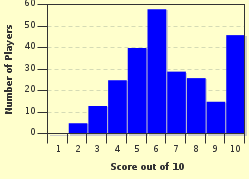Quiz Answer Key and Fun Facts
1. "What's in a name? That which we call a rose/by any other word would smell as sweet".
What play is this quote from?
2. "Tomorrow, and tomorrow and tomorrow".
What play is this quote from?
3. "Be not afraid of greatness".
What play is this quote from?
4. "A horse, a horse! My kingdom for a horse!".
What play is this quote from?
5. "I am dying, Egypt, dying".
What play is this quote from?
6. "When in the why and the wherefore is neither rhyme nor reason?".
What play is this quote from?
7. "More sinn'd against than sinning".
What play is this quote from?
8. "Why then the world's mine oyster".
What play is this quote from?
9. "Strive mightily, but eat and drink as friends".
What play is this quote from?
10. "O, what men dare do! What men may do!".
What play is this quote from?
Source: Author
sal16
This quiz was reviewed by FunTrivia editor
agony before going online.
Any errors found in FunTrivia content are routinely corrected through our feedback system.

